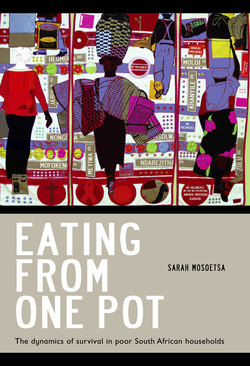Читать книгу Eating from One Pot - Sarah Mosoetsa - Страница 8
На сайте Литреса книга снята с продажи.
CALLS FOR THE INTRODUCTION OF A BASIC INCOME GRANT
ОглавлениеThe inadequacy of the present system of grants, along with rising levels of unemployment, has led to calls for the introduction of a Basic Income Grant (BIG), by both civil society and organised labour, as part of a ‘comprehensive social security system.’6 The Congress of South African Trade Unions (Cosatu) and various NGOs contend that such a system should be an integral part of social citizenship rights. The BIG Coalition has demanded a universal monthly grant of R100 (Cosatu, 2000b; Makino, 2003). A basic income grant, it is argued, would reduce arbitrary discretion, minimise opportunities for corruption and reduce the poverty gap by 74 per cent. With full take-up, the number of poor South Africans excluded from the social security system would be reduced to zero (Samson, 2002:77). Proponents contend that a BIG has the potential to contribute to economic activity and job creation in three ways: by adding to the accumulation of social capital and cohesiveness, by increasing the demand for labour by directly stimulating economic activity, and by its impact on the level and composition of aggregate demand (Samson et al., 2001).
The introduction of a BIG is seen by some as a fiscally unviable and over-ambitious project for South Africa (South Africa Foundation, 2002), an idea that is not even conceivable in many wealthier countries. Trevor Manuel, the former finance minister, argued that the notion of a basic income grant was ‘fundamentally flawed’ and that its implementation would bankrupt South Africa. He estimated that it would cost R83 billion. The government would ‘probably have to raise VAT by at least another 14 per cent to fund the R83 billion.’7 Critics of a BIG have also pointed out that welfare states have been under enormous ideological and political pressure around the world in recent times. The political and social environment that enabled their success no longer exists (Esping-Anderson, 1996; Pierson, 2001; Seekings, 2002). High unemployment rates have resulted in fewer tax contributions to the state. The restructuring of work and shift in government policies towards cost recovery and strict fiscal discipline have challenged the very notion of welfarism.
It has also been argued that state transfers do not necessarily reduce poverty and do not encourage real economic redress or reduce inequality. Such claims have been rejected by proponents of the BIG who argue that the benefits would have a ripple effect on the economy. Recent evidence from Namibia suggests that there would indeed be important socio-economic benefits if a universal grant were to be introduced.8 It does not appear likely, though, that the universal income grant will be adopted as national policy in the short term. The BIG initiative does, however, reveal a lot about the role of civil society and its relationship to the state in South Africa, a relationship that, as we shall see, also plays itself out in the two townships that are studied in this book.
